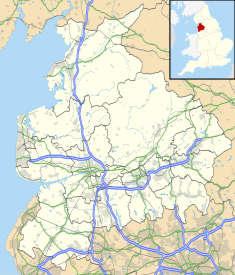Club Row is a row of sandstone terraced houses on Higher Road in the English market town of Longridge, Lancashire,[1] built between 1793 and 1804.[2][3][4] Grade II listed, and numbered 6 to 44, they each have slate roofs and were built by the Longridge Building Club,[5] one of the earliest terminating building societies in England.[6][7] They have two storeys and cellars entered at the rear, and each house has one bay. The windows and doorways have plain surrounds. The doorways are grouped in threes, the centre door leading to the rear yard. The cellars were used for handloom weaving.[8][3]
| Club Row | |
|---|---|
 The buildings in 2007, looking southwest | |
| Location | 6–44 Higher Road Longridge, Lancashire, England |
| Coordinates | 53°49′52″N 2°35′48″W / 53.83114°N 2.59676°W |
| Area | Ribble Valley |
| Built | 1793 |
Listed Building – Grade II | |
| Designated | 16 August 1983 |
| Reference no. | 1308531 |
Popular culture
editThe row is mentioned in Barry Durham's book The Legend of Arthur King and Other Tales of the Supernatural as the residence of British seaman George Hewitt.[9]
See also
editReferences
edit- ^ A History of Longridge and District, Thomas Charles Smith (1888), p. 40
- ^ Economic Planning and the Banking System, Institute of Bankers in Ireland (1968), p. 75
- ^ a b Historic England & 1308531
- ^ The Lancashire Cotton Industry: A History Since 1700 (1996), p. 345 ISBN 9781871236385
- ^ Economic Planning and the Banking System (1968), p. 75
- ^ Gentlemen in the Building Line, Isobel Watson (1989), p. 34 ISBN 9780951500309
- ^ Weavers of Dreams: The Origins of the Modern Co-operative Movement, David J. Thompson (1994), p. 129 ISBN 9781885641052
- ^ Hartwell & Pevsner (2009), p. 431
- ^ The Legend of Arthur King and Other Tales of the Supernatural, Barry Dunham, p. ISBN 9780244470630
- Sources
- Historic England, "Nos. 6 to 44 Higher Road, Longridge (1308531) (1308531)", National Heritage List for England, retrieved 8 December 2015
- Hartwell, Clare; Pevsner, Nikolaus (2009) [1969], Lancashire: North, The Buildings of England, New Haven and London: Yale University Press, ISBN 978-0-300-12667-9
